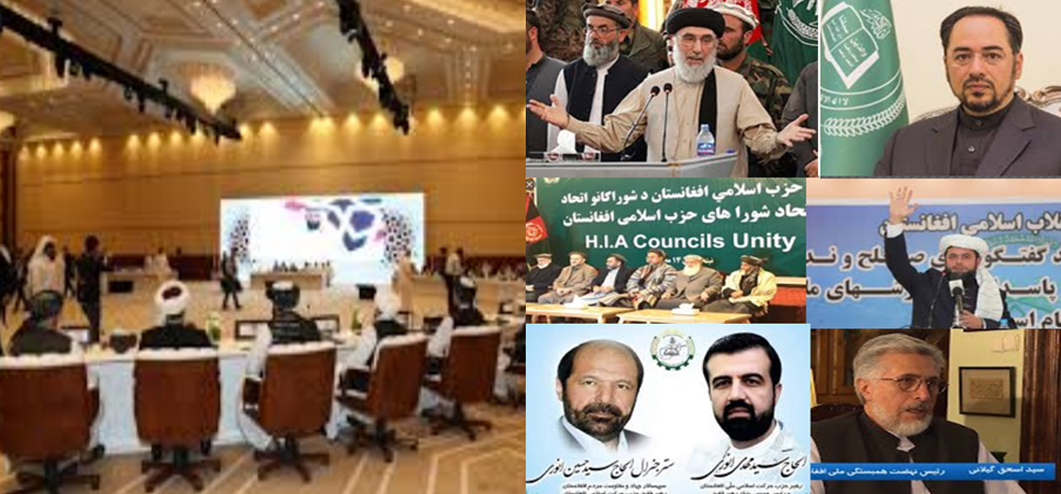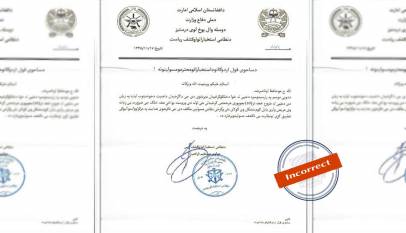Govt’s national consensus claim found exaggerated
KABUL (Pajhwok): The claim regarding the existence of ‘National Consensus’ on Afghan peace process is exaggerated at a time when some key political parties do not support the ongoing peace efforts and have strong reservations.
Experts define national consensus as the agreement of majority of stakeholders on issues of national interest, which may be expressed in different contexts.

The Afghan government and Taliban negotiating teams have agreed on procedural rules in Doha after around two and a half month of discussions and the second round of the talks kicked off in Doha on January 9. The talks are underway without any progress.
Claim:
National consensus on peace exists
Government officials often claim that national consensus is available on the peace process.
President Mohammad Ashraf Ghani during last year’s Geneva Conference said : “Over the past two years, Afghans created a national consensus on the need to achieve an enduring peace via political settlement with the Taliban—a peace that is in line with the values of our Constitution and international standards of human rights.
President Ghani on April 22, 2020 also reaffirmed that national consensus for peace existed.
Then Presidential Spokesperson Sediq Sediqi on July 6, 2020 had said that peace was the demand of people and a national consensus on this regard existed.
Fact Check:
The Afghan government has formed a 26-member High Council for National Reconciliation (HCNR). This body is comprised of 46 government and non-government figures, representatives of civil society and political parties.
Although the HCNR was designed to include a wide range of parties key leaders, including Gulbuddin Hekmatyar, leader of the Hezb-i-Islami Afghanistan (HIA), Salahuddin Rabbani, head of the Jamiat-i-Islami Afghanistan (JIA), Abdul Hakeem Muneeb’s led Harakat Enqelab-e-Islami, Syed Ishaq Gilani led National Unity Movement and Syed Mehdi Anwari led National Islamic Movement are not part of the ongoing peace talks as they have reservations over the government’s existing policy towards peace.
According to reports, former President Hamid Karzai, Jihadi Leader Abdul Rab Raosul Sayyaf, Abdul Karim Khalili, Mohammad Mohaqiq, Marshal Abdul Rasheed Dostum, JIA members Younis Qanoni, Mohammad Ismael Khan and Atta Mohammad Noor, MelliMahaz Party Head Syed Hamid Gilani, Nijat Party Head Zabihullah Mujadidi, HIA splinter group head Abdul Hadi Arghandiwal and Eng. Mohammad Khan are important members of HCNR.
On the negotiating committee, Afghan Chief Negotiator Masoum Stanikzai and the Afghan government’s negotiating team’s other members Ahmad Nader Naderi, Abdul Mateen Baig are government servants while Kaleemullah Naqibi, Ghulam Farooq Majroh, Abdul Hafeez Mansour and Khalid Noor are JIA members. Syed Mansour Naderi is a member of MelliPaiwand Party, Zarar Ahmad Muqbel is the representative of former President Hamid Karzai, Maulvi Enayatullah Balegh is the representative of Jihadi Leader Abdul Rab Rasoul Sayyaf, Mohammad Nateqi is the member of Wahdat Party, Fatema Gilani is member of Mahaz-e-Melli party and Rasoul Talib is the representative of Vice President Sarwar Danish. According to sources, First Vice President Amrullah Saleh has introduced Fawzia Kofi to the team while there is no information about Ayoub Ansari.
Hekmatyar was named as HCNR member and his close aide Ghirat Baheer was also named as member of the Afghan government negotiating team, but Hekmatyar refused to join the council while Baheer did not travel with the Afghan negotiating team to Doha.
Another senior HIA member Humayon Jareer said HIA rejected the ongoing peace process because HCNR members and the negotiating team had been picked by the government and therefore these two bodies were powerful and would be under the government pressure.
He said due to some reasons Afghan politicians and government were unable to build up national consensus for peace at a time when political parties often recommended to the president that a powerful and inclusive peace council should be formed in which everyone sees themselves and the body has the decision making authority.
Jareer, however, said that HIA still welcomed development in the peace process and strived for establishment of lasting peace in the country.
The HIA Councils Union is another splinter HIA group and its Political Affairs Head Syed Ahmad Karyab said that national consensus for peace did not exist and stressed that all sides should show flexibility and create national consensus for peace.
He termed national consensus as vital for durable peace in the country and added that it would help develop regional consensus as well.
Salahuddin Rabbani, JIA head, is also named as the member of HCNR but he has reservations over government decisions and did not participate in the meetings of this body.
Abdul Fatah Ahmadzai, JIA spokesperson, said every Afghan was in search of peace in Afghanistan, adding that the JIA did not want to participate in the process because it has reservations.
He said there was need for a national consensus for peace in which major political parties, civil society activists, religious scholars and relevant non-government officials could take part.
He said the existing HCNR is comprised of people from Presidential Palace and Peace Ministry and they were trying to move the peace process forward as per the will of the government.
He said individuals who were part of this process and call themselves JIA members were not actually party members and their membership had been revoked.
Abdul Hakeem Muneeb, Harakat-e-Enqelab Islami party head, said all sides wanted peace but there was no consensus on how to bring peace because three major parties HIA, JIA and his party were not part of this process.
Without going into details, he said besides these three political parties, there were other parties, tribes and influential persons who had not been asked about peace.
Muneeb blamed the government and said: “The government has no experience to bring about unity among people, teams and parties. The government itself is a hurdle to developing national consensus for peace and it has been struggling for its own survival.”
He said his party had strong reservations on the existing peace process and it perceived the HCNR a body that could not represent the nation.
The Afghanistan National Islamic Movement (ANIM) Party Head Syed Mehdi Anwari also said there was no national consensus on Afghan peace process.
He said his party’s consent was not sought over selection of the negotiating team members and the formation of HCNR, adding there was need for grand consultation with all political parties, civil society activists, religious scholars and neutral women.
He termed the development of consensus as vital and added there was no progress in peace talks due to lack of a grand national consensus.
Syed Ishaq Gailani, head of the National Unity Movement, expressed similar views and said every Afghan wanted peace, but besides JIA, HIA and some other political parties they also held reservations over ongoing peace process and believed that the dream for peace could not be realized until there was national consensus.
He said the HCNR needed to listen to all stakeholders and develop national consensus for peace. Gailani said people should not wait for reports from Doha and stressed over continued efforts for peace.
Former Afghan President Hamid Karzai on November 22, 2020 told the first meeting of the HCNR: “Beyond formalities, we support this council and strive for peace but these efforts could yield result only when all stakeholders work together.”
He stressed on participation of absent political leaders in the HCNR huddle, who did not attend the November 22 meeting.
But YousufSahaa, media spokesperson for Karzai, said: “We have no reservation on peace process and we fully support it and hope these efforts would yield positive result soon.”
FaridonKhawzon, HCNR spokesperson, said national consensus did exist on the peace process. He said peace process was a national mission and all Afghans supported it. Referring to the absence of some personalities from the HCNR meetings, Khwazon said they would participate in future meetings.
He added national consensus needed management and the leadership committee of HCNR was working on it.
Experts’ views: No consensus on peace process
Wadeer Safi, a political affairs expert, said in Afghanistan there was no national consensus on any issue of national interest since 2001 Bonn conference until the ongoing peace process, adding that every group in the country pursued their own political interest.
Besides HIA and JIA, there are many other political groups and individuals who have not been taken into confidence over the ongoing peace process and they held reservations on this process.
He said national consensus was defined as the demand of majority of the nation for wellbeing of a system and this could guarantee peaceful existence of a society, establishment of security, territorial integrity and security national interest but nothing like this existed in Afghanistan so far.
Najeeb Azad, another political affairs expert, divided political consensus on peace process into two parts — National Consensus and Political Consensus — and added that owing to different reasons, there was no national and political consensus on the peace process in Afghanistan.
He said for an elder person, peace would be the safety of his crop and an end to tyranny and persecution in a society, for a village woman peace may be the safety of her father, brother, husband and son and for a religious scholar peace would the safety of religious freedom.
Based on these points, he said peace might have different divination for every member of the society and there was need for formation of a unified strategy after analyzing all different prospects of peace.
“This is the Afghan government responsibility, but unfortunately every time some illogical, far from reality and deceiving slogans are heard from the government platform.”
He added: “The HCNR was incepted to end the 2019 election disputes, its purpose was not peace and Ghani and Abdullah had been at loggerheads over the HCNR structure for eight months.”
Azad said the government-appointed team for negotiations was not familiar with peace related matters, diplomatic norms and sensible regional issues.
“All this ends up at one point that no side thinks about peace and all efforts are for getting political power, therefore we can say there is no political consensus available.”
Outcome: Government officials claim national consensus exist on peace process but Pajhwok findings show some political parties and influential personalities are not part of the ongoing peace process due their reservations
Verdict: The existence of national consensus on the ongoing peace process is over exaggerated.
Nh/ma
Ahmad Sohaib Hasrat
Hits: 16919
Letter regarding ban on roaming during night is fake
KABUL (Pajhwok): The Ministry of Defence (MoD) and an expert have rejected the letter rega…



